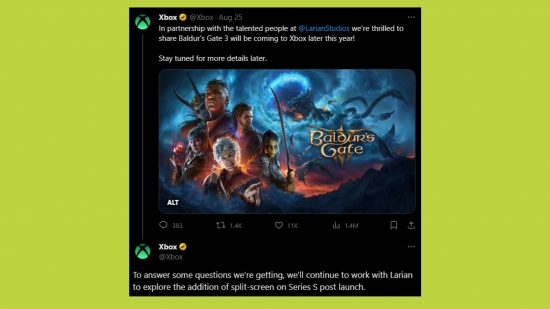If you’re looking for a console that’s cheap, cheerful, and can play almost all of the latest videogames out there, then the Xbox Series S really is your best option. Often available at around $200 less than a Series X and cheaper than a PlayStation 5 – disc drive or not – this smaller Xbox is a great way to stay up to date on new releases without breaking the bank. Although, it shouldn’t be considered a current-gen console anymore and players with a Series S really shouldn’t expect to see the same content available on this platform.
Other than the handful of PS5 exclusives out there, of course, an Xbox Series S lets you play any one of the new Xbox games available and all the best Xbox games already listed on the Xbox Store – just like the Series X. Sure, it might not have a disc drive or the ability to offer up things like 4K resolutions and ray-tracing at the same time, but you can still enjoy all the best Xbox Game Pass games at the press of a button and new (quite demanding) releases like Starfield, Modern Warfare 3, and Alan Wake 2 are all available on the platform.
However, while it’s far from a bad thing that Xbox is offering players a cheaper place to play the latest games, Microsoft’s commitment to feature parity for the Series X and Series S versions of new games is actually proving detrimental to the players themselves – as highlighted by Baldur’s Gate 3 and it’s delayed Xbox release. While we do now have a Baldur’s Gate 3 Xbox release date to look forward to next month, the fact that this going to be over three months after one of the best RPG games of all time dropped on PS5 is a little ridiculous. This is especially true when it seems as though the performance capabilities of the Series S and this commitment to feature parity has played a huge part in the delay itself.
To make matters worse, Microsoft has ultimately had to break its commitment to feature parity between the Series X and Series S, when it comes to Baldur’s Gate 3, to ensure that the game can launch on Xbox consoles before 2024. Microsoft is going to work with Larian to introduce missing features in post-launch updates, but as it stands, the Series S version of Baldur’s Gate 3 will just be an incomplete version of the game.
It might be impressive that this is the first case of something like this happening, when you look at the other games already available on the Series S, but this certainly isn’t going to be an isolated incident. This is also far from the first time the weaker console has proven problematic for developers. As another example, the Dying Light 2 devs admitted that the Series S’s smaller GPU was holding back improvements for the open-world zombie game – and that was all the way back in February 2022. As videogames continue to improve in the months and years to come, thus becoming more demanding on the platforms they’re being played on, the Series S is going to struggle more and more to keep up with the requirements.
So, we think Baldur’s Gate 3 should be a catalyst for change at Microsoft; it should alter it’s stance on feature parity permanently and realize that the Series S just can’t be considered as a console at the same level as the Series X. Larian Studios’ RPG is a clear example where sticking to this commitment has cost Xbox players. Those same players, though, should stop expecting a machine with weaker hardware to be able to handle the same content as more powerful current-gen consoles.

Sure, the Xbox Series S is an affordable way to play some of the latest games, but if you’re paying less for a current-gen console, you should expect less from the games you play on it – be that demanding graphics or demanding features. Moving forward, Microsoft should treat the Xbox Series S as a different generation of console entirely. While this might mean Series S players miss out on some content here and there, this would (with any luck) stop Xbox players as a whole missing out on entire games (like Baldur’s Gate 3) and, in an ideal world, improve the performance of games on Series S consoles more generally speaking.
A fair way to compensate Series S players missing out would be to make those Xbox games available at a lower price point than the ‘complete’ version on Xbox Series X, but we don’t think that will happen anytime soon. Xbox, for now, is still committed to delivering the same content to Series X players and Series S player – for better and worse. While admirable, this realistically can’t continue and the sooner Microsoft accepts that and adjusts expectations, the better.

